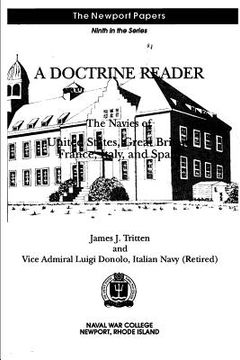Compartir
A Doctrine Reader: The Navies of United States, Great Britain, France, Italy, and Spain: Naval War College Newport Papers 9 (en Inglés)
Naval War College Press
(Autor)
·
Italian Navy Donolo
(Autor)
·
James J. Tritten
(Autor)
·
Createspace Independent Publishing Platform
· Tapa Blanda
A Doctrine Reader: The Navies of United States, Great Britain, France, Italy, and Spain: Naval War College Newport Papers 9 (en Inglés) - Donolo, Italian Navy ; Press, Naval War College ; Tritten, James J.
$ 14.20
$ 17.99
Ahorras: $ 3.79
Elige la lista en la que quieres agregar tu producto o crea una nueva lista
✓ Producto agregado correctamente a la lista de deseos.
Ir a Mis ListasSe enviará desde nuestra bodega entre el
Miércoles 15 de Mayo y el
Jueves 16 de Mayo.
Lo recibirás en cualquier lugar de Estados Unidos entre 1 y 3 días hábiles luego del envío.
Reseña del libro "A Doctrine Reader: The Navies of United States, Great Britain, France, Italy, and Spain: Naval War College Newport Papers 9 (en Inglés)"
In March 1993, the United States Navy and Marine Corps established the Naval Doctrine Command as the primary authority for the development of naval concepts and integrated naval doctrine. It has several specific roles-serving as the coordinating authority for the development and evaluation of Navy service-unique doctrine, providing a coordinated Navy-Marine Corps voice in joint and combined doctrine development, and ensuring that naval and joint doctrine are addressed in training and education curricula and in operations, exercises, and war games. Although this was the first time the sea services had established a formal command to prepare and publish multi-service naval doctrine, it was not the first time that either service, or navies in general, had formal written doctrine. In the minds of most serving officers, however, doctrine was something new for the fleet. Newport Paper Number Nine is the first of two publications in this series which will present the story of naval doctrine's history and theory for use in war colleges, command and staff colleges, professional schools, and other centers of excellence. The major message of these pages is that naval and navy doctrine is not new and there is value today in reviewing the lessons of past doctrinal development experiences. Under the leadership of the Naval Doctrine Command's first commander, Rear Admiral Frederick Lewis, U.S. Navy, the Command set out to examine history to learn the lessons of naval doctrine development from the past. This effort was not an attempt to publish history, as such. Instead, it was directed primarily as a study of history from the perspective of doctrine-a term generally not found in the index pages of naval historical studies. Our own navy and four European navies were selected for in-depth analysis, primarily because the history of these navies is well-documented and it was relatively easy to find the evidence of past doctrinal development once researchers became familiar with the concept. Newport Paper Number Nine contains the results of research conducted on the navies of the United States, Great Britain, France, Italy, and Spain. Each has a unique story to tell, and each story has value for us today. This paper concludes with an interpretive essay on the relationship of doctrine to technology, particularly revolutions in military affairs (RMAs). It questions the ground forces-oriented RMA paradigm and makes a strong case for the uniqueness of naval warfare. A forthcoming Newport Paper, which continues with two additional interpretive essays on the theory of military and naval doctrine and two essays that express the need for doctrine, takes the lessons learned from all these studies and provides the U.S. Navy and Marine Corps with the issues that must be addressed in naval doctrine publications of today.

